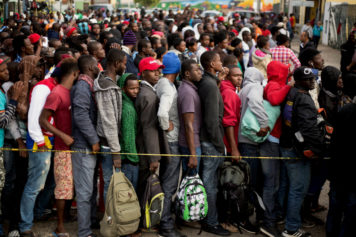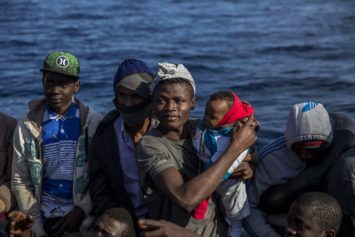
The Israeli government has ordered 38,000 African refugees, who are primarily from Eritrea and Sudan, to leave Israel or face indefinite incarceration. A group of Israeli pilots has refused to cooperate in the mass deportation of the asylum seekers from the country, reflecting a growing movement against the government policy. (Photo: Wikimedia Commons)
Israel is a hostile place for African people, and the recent decision by the Israeli government to deport thousands of African refugees, chiefly asylum seekers from Eritrea and Sudan, are a case in point. Israel has told the nearly 40,000 Africans to leave the country or face indefinite imprisonment. Deportations and imprisonment begin in April of this year according to Middle East Eye. Several pilots for the Israeli national airline El Al have refused to participate in flights deporting the refugees, who are classified as “illegal economic migrants” by the Israeli government.
One El Al pilot, Yoel Piterbarg, said on his Facebook page that Israel was founded by refugees. “Israel is populated primarily by Jews who, in their near and distant pasts, were refugees in countries around the world,” Piterbarg wrote. “The vast majority became citizens and a small number remained refugees. Most went through the Holocaust, many were forcefully expelled from their countries, and many others emigrated out of a desire to improve their lives in better countries that agreed to accept them.
“Out of all people we, the Jews, must be attentive, empathetic, moral, and leaders of public opinion in the world in how we treat the migration of refugees, who have suffered and continue to suffer in their countries of origin. … I will not fly deported refugees against their will for the legal reason (there is no other legal reason) that they are likely to endanger the safety of the flight,” he continued. In 2003, Piterbarg was one of 27 Israeli air force pilots who refused to participate in “illegal and immoral” operations in the occupied Palestinian territories.
“I have joined many of my good friends in declaring that I will not fly refugees to their deaths,” Iddo Elad, another pilot, wrote on Facebook. “I won’t take part in that barbarism.”
Another pilot, Shaul Betzer, stated: “There is no way that I, as part of a flight crew, would participate in taking refugees/asylum seekers to a destination where their chances of surviving (in a ‘third country’) are minuscule.”
This latest stance by Israeli pilots is part of a growing movement of hundreds of professionals who refuse to cooperate with the deportations and demand an end to the policy. Joining the pilots are 150 flight crew members who took out a full-page ad in the Israeli newspaper Haaretz condemning the expulsions and urging airlines not to participate. In addition, 51 school principals sent a letter to Israeli Prime Minister Benjamin Netanyahu and the country’s education minister calling for a halt to the deportations. “We teach tens of thousands of students about our past as refugees, persecuted people and asylum seekers during the darkest periods of human history, out of a personal and professional commitment to ensure ‘never again,’” the principals wrote. “We believe that asylum seekers, like all people, are entitled to have their natural rights protected, by virtue of their being human beings, by virtue of conventions that Israel has signed, and by virtue of the Declaration of Independence and Israel’s Jewish and human values.”
This comes as more than 400 television and film personalities, and more than 530 psychologists and 350 doctors have written letters and signed petitions in opposition to the deportation plan. In a letter to Netanyahu, the group of psychologists said the mass deportation “will add the State of Israel to the cycle of harm done to the refugees,” noting that “A large proportion of asylum seekers have already gone through difficult experiences, including persecution in their countries of origin under repressive and authoritarian regimes.”
The 38,000 Africans — 72 percent Eritrean and 20 percent Sudanese — arrived in Israel between 2006 and 2012, and escaped economic hardship and political repression in their home countries. Many live in south Tel Aviv, where residents blame them for crime. Under the law, an amendment to Israel’s Prevention of Infiltration Act, the African refugees face deportation or incarceration if they refuse to leave. The law singles out African people for mass expulsion. The law also closes the Holot detention center, which has held over 1,000 asylum seekers. “Infiltrators,” as Israelis derogatorily call them, are offered $3,500 and a plane ticket home or to a third country, presumably Rwanda or Uganda. Deported migrants face abuse, trafficking, exploitation and death, as some were reportedly killed by ISIS in Libya, or when sent to Rwanda find themselves dropped off in the dead of night without papers and told to cross the border into Uganda illegally. According to the UN Refugee Agency, the Israeli plan violates international law, including the 1951 Refugee Convention, of which Israel is a party and has legal obligations to protect refugees and those requiring international protection. Israel has not established a refugee system and accepts only a handful of people as refugees.
The deportation policy is racially based, as Israeli officials have pointed to the need to “protect the Jewish and democratic character” of Israel. Israeli Culture and Sports Minister Miri Regev called the African migrants “a cancer in our body,” then apologized to cancer patients and Holocaust survivors for her statement.
Netanyahu, who has expressed the need to remove African “infiltrators,” has praised President Donald Trump’s plan to build a wall on the U.S. border with Mexico, pointing to Israel’s own wall on its Egyptian border to keep out Africans:
President Trump is right. I built a wall along Israel’s southern border. It stopped all illegal immigration. Great success. Great idea 🇮🇱🇺🇸
— Benjamin Netanyahu (@netanyahu) January 28, 2017
Meanwhile, African asylum seekers have taken to the streets in protest, as hundreds of Israeli rabbis have vowed to house African refugees in private homes as part of the Anne Frank Home Sanctuary Movement. The movement, led by Rabbis for Human Rights, is named after Anne Frank, a Jewish girl whose family hid from the Nazis between 1942 and 1944 in a building in Amsterdam where her father worked. The Gestapo arrested the Frank family and sent them to concentration camps, where all except the father perished. “Anne Frank is the most well-known hidden person, and she was hidden so she would not be sent to her death — and we have documentation that these people are facing possible death,” said Rabbi Susan Silverman to Haaretz. Adding, “People risked their lives to save Jews, and we as a country are now saying we don’t want to risk the tiniest demographic shift? We have a prime minister who is quoting Pharaoh when he says [of the asylum seekers] that their numbers will grow. Pharaoh said the Hebrew slaves will grow and overcome us.”
A Gallup index has found Israel is sixth among the nations least accepting to migrants. Meanwhile, over the past two years, 22,000 migrants from Ukraine and Georgia — who are white — have entered Israel on tourist visas under the radar and have stayed.
The backdrop of Israel’s African migrant crisis is a 50-year occupation of the West Bank and Gaza Strip in a land where Palestinians will soon outnumber Israelis, and the denial of Palestinians’ right to self-determination. Members of the UN Human Rights Council have cited a deteriorating human rights situation in what some call an “apartheid state.” Some Israeli observers have compared the racism and “toxic ultra-nationalism” in Israel against Palestinians and Africans to the early stages of Nazism. Nonwhite Israeli Jews, including Jews of Ethiopian descent, face institutional racism and police violence. Israeli citizens of Palestinan descent are second-class citizens, a reality which was on display when the Arab MPs were forcibly removed from the Israeli Knesset for protesting U.S. Vice President Mike Pence’s speech:
The 13 Israeli-Arab members of Israel’s Parliament held up signs saying “Jerusalem is the Capital of Palestine” and were forcibly removed by security as Pence started to speak. Can you imagine Capitol Police dragging members of the congressional black caucus off the House floor?
— Andrea Mitchell (@mitchellreports) January 22, 2018
This is the moment Palestinian MPs were kicked out of the Israeli Knesset after protesting the US Vice President Mike Pence’s speech. pic.twitter.com/w7CSJx6MSb
— Al Jazeera English (@AJEnglish) January 22, 2018
As for the African refugees in Israel, much has been done to make them feel uncomfortable and unwelcome. For example, in 2016 a group of Israeli teenagers lynched a Sudanese refugee named Babikir Adham-Uvdo in the Tel Aviv suburb of Petah Tikva, right outside of the city hall. Adham-Uvo’s face was so badly beaten he was unrecognizable, as the beating lasted an hour. After the lynching, which has been compared to the 1955 murder of Emmett Till in Mississippi, the city’s mayor attempted to expel the African refugees by cutting of their water and electricity.
The South Tel Aviv Liberation Front focuses on expelling Africans, using tactics such as approaching African people on the street and giving them condoms, telling them that Israel does not want Africans to have babies.
A police station honored May Golan, the leader of an anti-African violence campaign that encourages acts of anti-African violence, whips up racist mobs into a frenzy and accuses Africans of rape, murder and destroying the Jewish state. Golan was appointed to the ruling Likud Party’s steering committee on African refugees. In one particularly egregious case of anti-African violence, a man attacked an Eritrean baby by stabbing her in the head with a pair of scissors, leaving her with motor damage and a limp. The man claimed God told him to kill a Black baby.
According to Roni Alsheikh, the head of Israel’s police force, Africans and Arabs are more are more criminal, as if to sanction police brutality and racial violence against them. “In all criminological studies worldwide, it has been proven that immigrants are more involved in crime than others, it shouldn’t surprise [us]. In addition, all studies prove that youths are more involved in crime. When these two are joined together, a situation in which a certain community is involved in criminal activity comes about. This was the case [with all concentrated groups of new immigrants to Israel],” he told the Israel Bar Association.
“When there’s a community that’s more involved in crime, Arabs or East Jerusalem residents as well, and the statistics are [publicly available], then when a police officer encounters a suspect, it’s natural for his brain to suspect him more than he would have if [the suspect] were someone else, it’s natural.”


